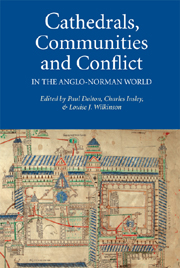Book contents
- Frontmatter
- Contents
- List of Illustrations
- List of Contributors
- Preface
- List of Abbreviations
- Introduction
- 1 The Dangers of Invention: The Sack of Canterbury, 1011, and the ‘theft’ of Dunstan's Relics
- 2 Remembering Communities Past: Exeter Cathedral in the Eleventh Century
- 3 Communities, Conflict and Episcopal Policy in the Diocese of Lichfield, 1050–1150
- 4 The Acta archiepiscoporum Rotomagensium and Urban Ecclesiastical Rivalry in Eleventh-Century Rouen
- 5 Cathedrals and the Cult of Saints in Eleventh-and twelfth-Century Wales
- 6 A Bishop and His Conflicts: Philip of Bayeux (1142–63)
- 7 Ecclesiastical Responses to War in king Stephen's Reign: The Communities of Selby Abbey, Pontefract Priory and York Cathedral
- 8 Secular Cathedrals and the Anglo-Norman Aristocracy
- 9 The Lives of Thomas Becket and the Church of Canterbury
- 10 Caught in the Cross-Fire: Patronage and Institutional Politics in Late twelfth-Century Canterbury
- 11 Crown, Cathedral and Conflict: King John and Canterbury
- 12 The English Monasteries and their French Possessions
- Index of People and Places
- Other Volumes in Studies in the History of Medieval Religion
12 - The English Monasteries and their French Possessions
Published online by Cambridge University Press: 12 September 2012
- Frontmatter
- Contents
- List of Illustrations
- List of Contributors
- Preface
- List of Abbreviations
- Introduction
- 1 The Dangers of Invention: The Sack of Canterbury, 1011, and the ‘theft’ of Dunstan's Relics
- 2 Remembering Communities Past: Exeter Cathedral in the Eleventh Century
- 3 Communities, Conflict and Episcopal Policy in the Diocese of Lichfield, 1050–1150
- 4 The Acta archiepiscoporum Rotomagensium and Urban Ecclesiastical Rivalry in Eleventh-Century Rouen
- 5 Cathedrals and the Cult of Saints in Eleventh-and twelfth-Century Wales
- 6 A Bishop and His Conflicts: Philip of Bayeux (1142–63)
- 7 Ecclesiastical Responses to War in king Stephen's Reign: The Communities of Selby Abbey, Pontefract Priory and York Cathedral
- 8 Secular Cathedrals and the Anglo-Norman Aristocracy
- 9 The Lives of Thomas Becket and the Church of Canterbury
- 10 Caught in the Cross-Fire: Patronage and Institutional Politics in Late twelfth-Century Canterbury
- 11 Crown, Cathedral and Conflict: King John and Canterbury
- 12 The English Monasteries and their French Possessions
- Index of People and Places
- Other Volumes in Studies in the History of Medieval Religion
Summary
It is a well-known fact that during the years between the Norman Conquest of 1066 and King John's loss of much of his continental dominion in 1204, the religious of France came to possess wide estates in England. These English lands, administered directly by french monks or forming the endowment of numerous alien priories, remained in the custody of their French landlords even after 1204, providing an important link between England and the continent for much of the thirteenth and fourteenth centuries. Less familiar than this French acquisition of English lands is the reverse process by which English monasteries came to possess lands in Normandy or elsewhere across the Channel. The present brief survey is intended to draw attention to these french estates and, in particular, to examine the peculiar history of the endowments, at La Rochelle and Lyon, conferred upon the archbishops and the cathedral church of Canterbury. It is to be hoped that such a survey may provide a useful, if minor, counterpoint to the better known history of the alien priories in England. In the process, it may throw some light on Anglo-French relations in the aftermath of the Norman Conquest and upon the sense of ‘community’ felt by religious institutions on either side of the Channel.
Very few English houses ever possessed lands across the Channel, all but one of them being monasteries in the south of England, for the most part established on or near to the coast.
- Type
- Chapter
- Information
- Cathedrals, Communities and Conflict in the Anglo-Norman World , pp. 221 - 240Publisher: Boydell & BrewerPrint publication year: 2011



